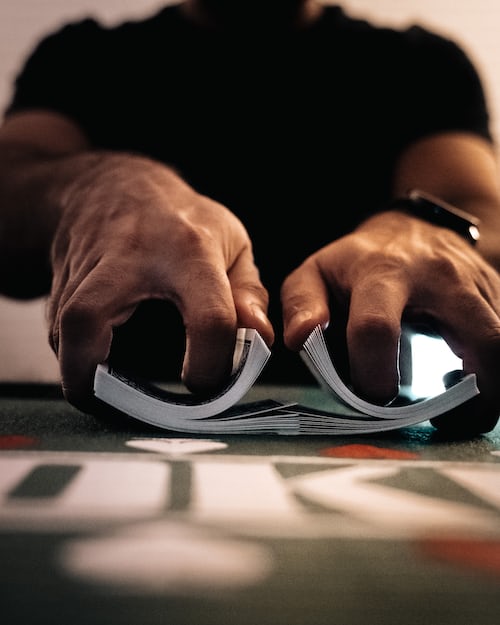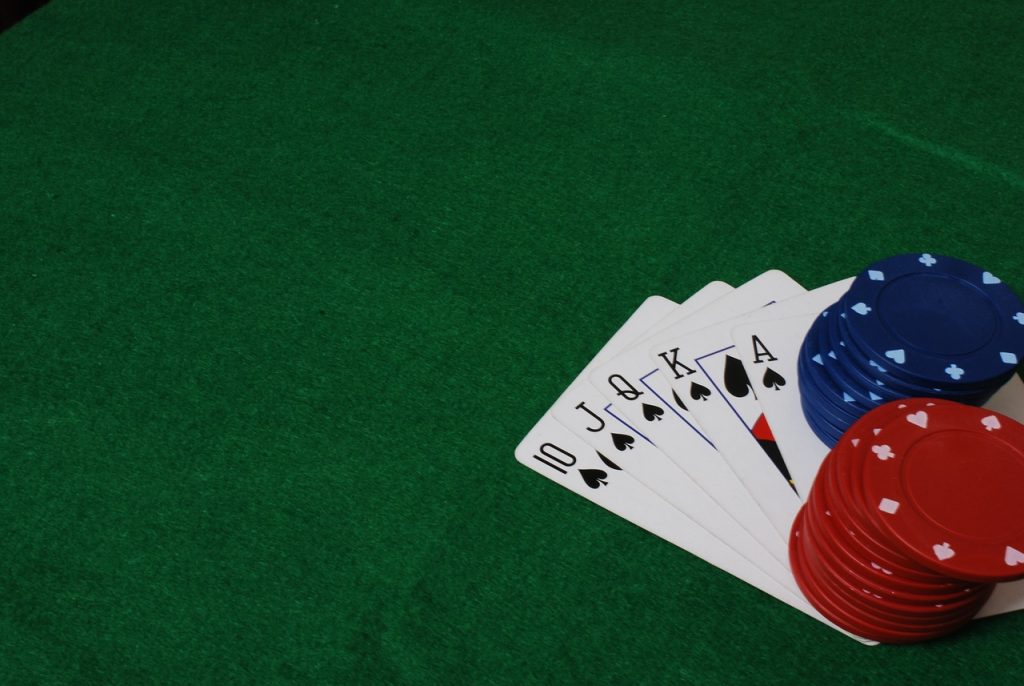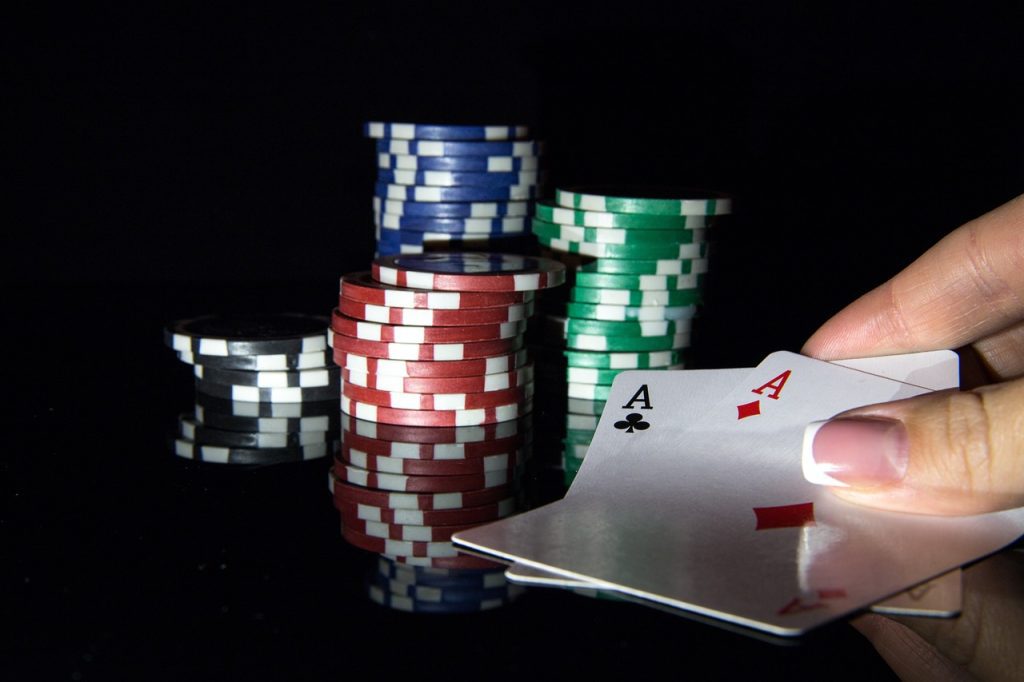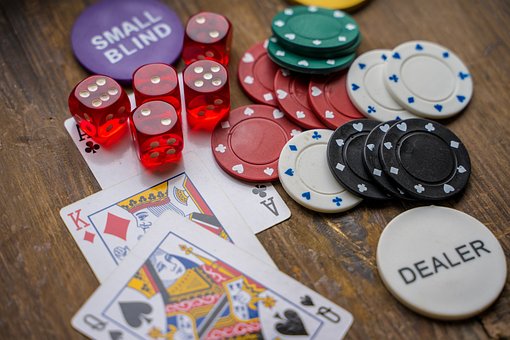The post 5 Advanced Poker Tips to Help You Win More Pots appeared first on Championnat-De-Poker.
]]>This article will highlight five advanced tips to help you take your poker game to the next level.

One of the key strategies to winning more pots is knowing when and how to bluff effectively. One technique that successful poker players use is using non-made hands with backdoor flush draws to bluff.
Experienced players know the importance of recognizing and utilizing their non-made hands. These can include plays such as bluffs, semi-bluffs, and various types of draws. While non-made poker hands may not have immediate value, their strategic potential can be significant.
This strategy can be especially effective in no-limit hold’em games because it allows you to represent a strong hand while hiding the fact that you have a weak one. By raising or betting aggressively with a non-made hand and a backdoor flush draw, you can make your opponents think twice about calling or raising. It will ultimately take the pot down without having to show your cards.
When it comes to poker strategy, a big part of winning is knowing when and how to use different tactics to your advantage. One such tactic is the check-raise, and if you’re looking to up your game, you might want to consider using it more frequently from the big blind.
You can pressure your opponents, potentially forcing them to fold and allowing you to scoop up more pots without relying on premium hands. Plus, if you can pull off a successful check-raise, you’ll also be able to build a bigger pot that you can later win if your hand improves on the turn or river.
It isn’t a strategy to use blindly in a poker tournament or any game, as it requires careful consideration of your opponent’s tendencies and the board’s texture.
Pocket Pairs
Having a pocket pair means you have two cards of the same rank in your hand, which increases your chances of hitting a set (three of a kind) on the flop, turn, or river. And in multiway pots, your opponents are likelier to have weaker hands, making it easier for your pocket pair to triumph.

There are some risks, including a possible flush or straight forming on the board, but with the right strategy, pocket pairs can be an intelligent way to build your poker bankroll in multiway pots.
Knowing when to play aggressively or slow your pocket pair can make all the difference. Stay focused, stay aware, and remain confident in your pocket pairs.
Suited Connectors
Suited connectors are an exciting way to play poker, especially in multiway pots. They have the potential to turn into valuable hands, making them money-makers. But how can we use them correctly?
First, we must understand that suited connectors require some context to play them to their full worth. We should only enter a pot with suited connectors when we are in a late position, facing less than four bets. They also work great in pots where other players are limping in or calling with weak hands.
The key is to be patient and wait for the right cards, such as over or suited cards. With practice and the right mindset, you can make the most of suited connectors and become a successful multiway pot player.
Poker is a game about making strategic moves and taking calculated risks. One such move is the check-raise with draws after calling a 3-bet.
It might seem intimidating initially, but it’s a technique that can help you win more pots and keep your opponents guessing. Waiting to move until after your opponents have put in more chips effectively increases the pot size and creates opportunities for bigger payouts.
Timing is key. It would help if you were confident that your draw is worth the investment and that your opponents aren’t likely to have a hand to beat you.

The nut advantage means that you hold the best possible hand at that moment with the cards on the table. It puts you in a commanding position over your opponents, who may have a weaker hand.
Recognizing when you have the nut advantage lets you make more informed decisions about how much to bet, raise or fold. Sometimes, it may be possible to bluff your opponents into thinking you have the nut advantage when you don’t. It will allow you to win the hand despite having a weaker hand than your opponents.
Having the nut advantage isn’t always enough to seal the deal. It is where over-betting comes in. Over-betting lets you put more pressure on your opponents and force them into difficult decisions. This strategy is particularly effective when you have the nut advantage, as your opponents will be less likely to call or raise without a strong hand.
Overbetting has drawbacks, so weighing the risks and rewards before making this move is essential. Considering over-betting when you have the nut advantage can be an innovative and effective way to win more pots and come out ahead when you play poker professionally.
Conclusion
Poker is a complex game that requires skill, strategy, and a lot of practice. But with the right techniques, multiway pots can be an effective way to win more hands. Whether pocket pairs, suited connectors, or over-betting when you have the nut advantage, plenty of techniques help you become a winning poker player.
The post 5 Advanced Poker Tips to Help You Win More Pots appeared first on Championnat-De-Poker.
]]>The post Mindset Upgrade Unlocked: Keys to a Stronger Mental Game in Poker appeared first on Championnat-De-Poker.
]]>It may seem simple at first glance, but mastering the mental game of poker requires proper knowledge. To help you do that, we’ve compiled the keys to help your mind stay strong in various poker-related matters.

The Right Expectations
It can be very easy to get too caught up in the idea that you are going to win every hand or that you are going to make your opponent fold every time they face your raise, but this kind of thinking is not productive and will lead to disappointment. Instead, focus on playing your best and making decisions that align with each situation’s odds and expected values.
That applies to what happens in the game and your long-term poker journey. For example, expecting you will win big with each session can prevent you from making smart decisions and lead to costly mistakes. Instead, focus on improving your game and understanding the poker strategies employed by successful players; this will make it more likely to make good calls every step of the way.
Accepting Odds as Part of the Game
Call it odds, luck, or variance – no matter how you look at it, you must accept that some aspects of playing poker are outside your control. Making the best decisions can help mitigate or eliminate luck factors in some rare cases, but you will still be at the mercy of the cards. Realizing this and accepting it will help give you perspective when things don’t always turn out as planned.
Aside from the cards, another chance-based aspect of the game is the opponents you could match up with. You have no control over who you come up against, their strategies, and the style of play they adopt. However, rather than fear facing strong competition, use this as an opportunity to test your skills and improve.
It’s also important to understand that while your luck will eventually improve after a bad streak, there is no way to know when it will happen. That means you shouldn’t try to chase your losses when the odds aren’t in your favor. You’re better off trying again at another time instead of trying to force a win.

Setting The Right Goals
Having the right goals is also important for having a strong mental game in poker. Taking on too many goals at once can be overwhelming and lead to frustration, so it’s important to break them down into smaller, more manageable goals.
Additionally, focusing on the process instead of simply striving for results can help keep your motivation high and reduce stress. For example, you’re learning to read your opponent’s tells. Rather than be too excited about how this particular skill will benefit your game, you should find satisfaction in learning and understanding what each tell means. Eventually, this skill set will help you to make more informed decisions and reach your goals.
Aside from setting the right goals, you must also learn to remember them while playing. After all, it’s very possible to forget them in the heat of the moment. For example, if your goal is to build your bankroll, it can be difficult to remember if you suddenly feel like you must chase losses.
Positive Self-Talk
It can be easy to beat yourself up after losing a big pot or make excuses for your opponents being luckier than you. But instead of engaging in negative self-talk, focus on the positives and what you can learn from each situation. Celebrate small wins, stay confident, and remind yourself that it is all part of the game.
At the same time, you should remember that positivity doesn’t mean blind optimism. Acknowledge bad beats when they happen, stay humble, and be realistic about the situation. Doing so will help you control your emotions and make better decisions at the poker table.

Practicing Mindfulness
This particular type of meditation has many applications, including poker. And in the game, that means staying on the poker hands you’ve chosen to play without letting your thoughts wander. Doing so will help you make better decisions and reduce stress during the game, improving your performance. Some simple techniques can help you practice mindfulness while playing, such as taking deep breaths or counting your chips.
Mindfulness also means focusing on the present rather than being too concerned with future possibilities. It may seem counterintuitive because predicting what the opponent will do next is an unavoidable part of poker, but mindfulness isn’t about not trying to guess what could happen.
Instead, it’s about avoiding distractions caused by being too fixated on the future. After all, figuring out everything that could go wrong or being too sure about a particular outcome could take away your attention from what’s happening in the present. It can also cloud your judgment. Rather than fall into either trap, you’re better off making a few intelligent guesses and playing in the now.
Have the Right Poker State of Mind
By setting the right goals, engaging in positive self-talk, practicing mindfulness, and learning to accept the randomness of each hand, you can improve your game and ultimately win more mental games. Doing those things, however, is easier said than done. Nevertheless, through constant practice and learning from your mistakes, you can develop these keys that will level up your mental game.
The post Mindset Upgrade Unlocked: Keys to a Stronger Mental Game in Poker appeared first on Championnat-De-Poker.
]]>The post Are You Anxious About Playing Poker? Find Out if You Have Poker FOMO! appeared first on Championnat-De-Poker.
]]>Although the phrase “fear of missing out” might seem harmless and helpful, it causes anxiety and can originate from concerns like not being chosen for a team or feeling nervous about a poker opponent’s successes. It could also apply to the stress of securing a spot on a popular online poker website.
As a result, FOMO can lead to various psychological distresses, including tilt. Therefore, it is essential to explore the origins of the fear of missing out and determine when it becomes concerning for its impact.

Where Does FOMO Come From?
FOMO, which stands for Fear of Missing Out, originated in a 2004 op-ed piece published by The Harbus – the magazine of Harvard Business School. Since then, it has become popular and was even added to the Oxford Dictionary in 2013.
The enduring popularity of FOMO suggests that it will continue to be relevant in the future. Initially, FOMO was associated with the anxiety caused by constantly checking social media updates. People experiencing Fear of Missing Out (FOMO) must keep themselves informed and ensure they don’t miss out on essential updates regarding different topics.
This can be dangerous, as those with minority opinions may face severe consequences on social media platforms like Twitter or Facebook, which can further lead to real-life situations such as job loss, qualifications revocation, and even physical assault.
Over the years, FOMO has expanded its scope to cover various areas of human behavior, such as obsessive behavior on social media, financial trading, and even poker tilt from the anxiety and frustration of not being able to keep up with the latest trends and games.
The common thread linking these activities is their development and growth through internet technology. With internet access being more widespread on different devices, it’s no wonder many people have been impacted by FOMO-related discomforts regarding poker and poker hands.
When Do We Experience FOMO?
Do you ever feel like you’re missing out when relaxing at home in your pajamas or enjoying a good book or movie after a long day? That feeling might arise when you receive a text from one of your friends.
When your finger pushes the dreaded button, a wild house party appears on-screen with loud music and friends laughing uproariously. Suddenly, you realize that not going out tonight was an epic mistake; why did you think it would be enough to stay home? Fear of making the wrong decision can be daunting. The terrible decision settles in like a heavy blanket, leaving your best-case scenario far behind.

Discovering How FOMO Impacts Poker Games
It’s important to understand that FOMO is not a new phenomenon. It’s an instinct that humans have always had. Our survival as a species depends on our social connections, so being included in the group could pose a risk throughout history.
Experiencing these feelings can have physical effects, such as butterflies in the stomach and a racing heartbeat. FOMO, or the fear of missing out, can lead you to play hands that you should fold before seeing the flop.
This fear does not come from an external threat but can still affect your brain and decision-making process. Although some professional players may be able to profit in the long run with sure hands in early position, such as suited one- or two-gappers, most players cannot.
If you need help making decisions when you’re not in a favorable position, you may be widening your range of starting hands too much because of FOMO. Ask yourself if you’re losing money by hoping for lucky cards or overreacting to a random player winning big with a terrible starting hand.
Playing casino games can lead to FOMO, which doesn’t necessarily mean you have a gambling problem. However, it’s essential to be cautious and avoid a potential poker tilt. We tend to stay at table games longer than necessary to exploit profitable opportunities.

But it’s important to exercise caution and not let this behavior become unreasonable, as it may lead to problems later. When playing poker online and live, we must remind ourselves that our minds don’t automatically adjust to the game’s requirements.
Our minds need help grasping the game’s intricacies because our usual pattern recognition abilities, which help us recognize an opponent tell or classify a gambler as passive or daring, are not applicable here. Our brains are programmed to realize that even with a bad hand, we may still get lucky and win something on the flop.
The fear of missing out (FOMO) can be triggered when you feel like investing will make you miss out on something. This may lead you to bet more than you should on a bad hand. Unfortunately, some people don’t take responsibility for their FOMO decisions. Surprisingly, some feel relieved after taking the risk, regardless of whether it succeeds or fails.
Conclusion
Poker FOMO is an increasing issue in the poker community and can severely impact bankrolls and players’ mental health. Although feeling FOMO can be uncomfortable, it’s important to remember that missing out on big pots or tournaments won’t ruin your career as a poker player.
Learning how to play smarter, implementing sound bankroll management strategies, and having the discipline to stick to them will make all the difference. With this knowledge, you will be able to take advantage of opportunities presented while avoiding costly mistakes from inappropriate actions influenced by rush decisions made in the heat of the moment due to FOMO.
For those who strive for success in poker and improve their poker strategy, understanding your inner state and eliminating FOMO should be part of your path forward.
You can become a skilled and successful professional poker player by understanding what triggers poker-related FOMO and taking steps to counter its effects. So next time you feel the FOMO, remember: to step back, take a deep breath, and think about what you’re doing before you put your money at risk.
The post Are You Anxious About Playing Poker? Find Out if You Have Poker FOMO! appeared first on Championnat-De-Poker.
]]>The post Want to Pepper Interest in Your Home Games? Introducing Mixed Games Poker — The Spice You Need! appeared first on Championnat-De-Poker.
]]>Unlike the somewhat repetitive nature of poker, mixed games introduce a new world of exciting experiences that are enjoyable to explore. However, it can be overwhelming at first due to their unique formats. That’s why we have designed a guide to assist you in getting started with mixed games.

What Are Mixed Poker Games?
Mixed poker games involve multiple variations of poker combined into one game, sometimes up to ten. The games rotate from one type to the next, such as moving from Hold’ em to Omaha. The rotation speed differs based on the house rules and whether playing cash games or tournaments.
Two common ways to rotate games in a tournament are using levels/blinds or the number of hands played. With levels/blinds, a new game is played every 3-60 minutes when the blinds increase. With several hands, a new game is played after a predetermined amount of hands, such as every nine hands in a full-ring cash game.
Strategies to Consider
To avoid drawing the short stick during a good poker game, you must learn the basic strategies of each game you play. Even if you can only become an expert at some games, knowing these basics will prevent your opponents from taking advantage of gaps in your knowledge.
For example, in 2-7 Triple Draw, it’s advisable to avoid playing hands that don’t include a 2, and in high-low games, aiming for a low hand can be more beneficial since it can potentially win in two ways.
Knowing even the most basic strategies can give you a significant advantage over someone who knows nothing about the game in every game. Learning these winning strategies for any game you plan on playing is relatively easy.
Even for the most obscure matches, there are strategy books available. You can search for relevant articles or chapters within books if they are not available. Additionally, there are numerous instructional videos and strategy articles for most games, including poker and poker cards.

Finding a game that includes all the specific games you are looking for may be challenging. Suppose you discover a $10/$20 B.O.T.E. game that offers Omaha, triple draw, and stud hi/lo, but you have no prior knowledge of badugi. In this scenario, you might take a break when the game changes to badugi by pretending to go to the restroom.
Skipping one round in a mixed game is generally not recommended. If you join a mixed game, make sure you are willing to play all the games involved. However, from an ethical perspective, missing one orbit of a game is not a serious offense. Consider how frequently players step away from the table during a regular Hold’ em or Omaha cash game. If the game changes only when the dealer pushes or every two orbits in mixed games, it’s challenging to skip an entire game. It’s unfair to your opponents, and it’s hard to justify being away from the table for a long time.
Furthermore, it can be advantageous to try playing a game you are less familiar with or not as good at. While reading books or watching online training videos can help enhance your skills, the key to becoming proficient is through practice. The most effective way to improve is by gaining experience playing the game.
Instead of trying to become an expert in every poker variation, focus on a few games that you enjoy and are good at. Play those games more aggressively and take advantage of your opponents’ weaker skills in those games. Remember, it’s impossible to master every variation, so focus on what you do best.
If you need to be more skilled in certain games, it’s better to play cautiously and aim to lose money in cash games, at least not getting eliminated in tournaments. However, it would be best if you eventually worked on improving your skills in those weak games. Otherwise, you will always be a target whenever those games are played.

To improve your game, observe your opponents to identify their weaknesses. Please note which games they make the most mistakes playing or play fewer hands. This information can guide you to play more aggressively or steal their blinds and antes. Remember, every game is a chance to learn, and winning isn’t always necessary to benefit from a mixed poker game.
What are the recommended things to take notes on during gameplay? Take note of your opponents’ most substantial and weakest games and any opportunity you can use to your advantage in the future. Write down your best and worst games in that rotation. If you encounter hands you need clarification on, jot them down so you can discuss them with your peers or in a strategy forum later. Also, note the poker hands you want to review using tools such as a hand replayer and odds calculator.
Focus on taking high-quality notes to improve your performance and avoid losing money in mixed poker games. These notes can help you identify your weakest areas, which you can then work on strengthening. This tip applies to all types of poker games, not just mixed formats.
Final Thoughts
Mixed games are an enjoyable way to challenge your skill and luck in poker. Whether you’re an experienced pro or new to the game, it pays to practice these strategies and learn to adapt to each game type. Playing mixed games requires knowledge of different formats, but with some experience, you can soon become a master at this enjoyable variation.
Knowing when to play sure hands and when to take risks is critical. Ultimately, understanding the differences between the various types of card games available within the mixed game will significantly improve your odds of success and greatly improve your poker strategy. So be sure to put in the time, practice, and refine your skillset, and good luck!
The post Want to Pepper Interest in Your Home Games? Introducing Mixed Games Poker — The Spice You Need! appeared first on Championnat-De-Poker.
]]>The post Poker Hands Review: When Should You Call with Just Ace-High appeared first on Championnat-De-Poker.
]]>On the other hand, there are some situations when it is worth calling with an Ace-high hand in hopes of making something better. This article will review common scenarios for considering calling with this hand.

Against a Small Bet
When it comes to poker, sometimes it’s not always about having the best poker hands but understanding your opponent’s moves and making strategic decisions. If you face a small bet and suspect that your opponent doesn’t have a strong hand, it may be tempting to fold.
However, consider holding onto this hand and calling instead. It allows you to catch a card on the turn or river that could give you a pair and secure the win. Of course, it’s always a risk, but thinking critically and weighing the potential outcomes can make all the difference in a poker game.
Against a Weak Bluff
The art of deception plays a significant role in winning in a game like poker. Poker players must observe their opponents’ actions and behavior to identify their tells and tendencies.
Sometimes we may find ourselves in a predicament where we think our opponent is bluffing, but we’re not entirely sure. In such situations, calling with an Ace-high can be a smart move. Why? Calling may give you more information about your opponent’s hand and may even help you win the pot if your assumption is correct.
In addition, if you fold with a potentially strong hand, you may regret it later. If you doubt your opponent’s hand, don’t be afraid to call with this hand and trust your instincts.
In Multiway Pots
It’s always important to read the other players at the table. If you find yourself in hands with multiple players and suspect someone is trying to steal the pot with a weaker hand, don’t be too quick to fold. It may be worth sticking around with this hand.
This move is about more than just the strength of your hand, but rather the potential weakness of your opponent. By making this call, you’re showing that you’re not easily intimidated and willing to take chances when the potential payoff is worth it.
With some clever maneuvering, you might end up with poker winning hands. So don’t be afraid to take a chance and make that call.

In Position
If you find yourself with this type of hand during a poker game, it’s not necessarily bad. It could end up being quite advantageous for you.
Before making rash decisions, it’s worth considering the possibility of calling a bet and paying attention to what your opponent does on the next street. This extra information can give you valuable insight into their hand and help you decide whether to fold or continue playing.
There’s no need to give up on your hands immediately; take your time and use it to your advantage. The key to success in poker is understanding your poker odds and using it to your advantage.
Against a Draw
If you suspect your opponent is trying to draw to a strong hand, but you’re not convinced they’ll make it, calling with an Ace-high can be the right move. While it may seem counterintuitive to play a hand that isn’t particularly strong, sometimes the element of surprise wins the game.
Calling with a seemingly weak hand throws your opponent off their game and gives you the upper hand. It’s essential to assess the situation carefully and consider all possible outcomes before making big bets.
But if you’re feeling confident, don’t be afraid to trust your instincts and take a calculated risk. Always be cautious but remain strategic while playing poker.
When You Have Outs
Sometimes, calling with just this hand might be a good strategy. One of those times is when you have outs. Outs are the cards that can improve your hand and give you a better chance of winning the pot.
If you have a few outs, calling could be worth it. Of course, this isn’t a strategy you should always use, but it’s something to remember when playing.
You could win big if you play your outs correctly and improve your hand.

Against an Indecisive Player
Many players hold off on calling with this type of hand, but certain situations can be beneficial. Another one of these situations is when you are up against an indecisive player.
If your opponent struggles to decide or seems unsure of their hand, calling with this hand can pressure them and potentially lead to them folding. This strategy should only be used in some situations, but it is essential to recognize when it can work to your advantage.
Staying attentive and aware of your opponent’s behavior lets you make a calculated decision that could benefit your game significantly.
When You Have Played Aggressively
Holding with uncertain hands can be daunting in any poker game. But there are certain scenarios where a call with this type of hand can be an intelligent play, and that’s when you’ve played aggressively.
By taking control of the pot with a series of bets and raises, you’ve put pressure on your opponent, forcing them to doubt the strength of their hand. And if they decide to move, their hand is more likely to be weaker than if they were in control.
Conclusion
While it can often be difficult to call with an Ace-high, there are situations in which it can be profitable. Knowing when to call using this hand can improve your poker game and allow you to win more pots. Remember these scenarios when playing; you should find that calling with the hands you have becomes more accessible and profitable.
The post Poker Hands Review: When Should You Call with Just Ace-High appeared first on Championnat-De-Poker.
]]>The post When to Fire Double Barreling in Poker Games appeared first on Championnat-De-Poker.
]]>That’s why you must understand when and how to execute a double barrel effectively. In this article, we’ll dive into the double barrel strategy, covering the best situations to use it. Get ready to elevate your game and keep your opponents guessing with the power of the double barrel.

Basics of Double Barreling
It may seem enjoyable to continually bet against an opponent who frequently calls, but remember that trying to bluff players who rarely fold can be bad for your bankroll. It’s helpful to consider your opponent’s tendencies, such as if they like to continue with weaker hands or aim to reach showdowns often.
The more information you have about your opponent, the easier it is to decide if a second bet is wise. If you choose to go for a second bet, it should be a bluff or semi-bluff intended to win the pot immediately. To minimize the damage if your double barrel fails, it’s advisable to have a hand with some chance of winning on a lucky river card.
Typically, when making a continuation bet on the flop with a hand, it’s common to follow up with a second bet on the turn if you have at least one overcard. Having just one overcard is the minimum amount of equity required for a successful second bet.
Only bet on the turn if there’s a chance you could win the hand if called, and the more equity you have, the better. This is applicable in most bluffing scenarios. The turn card should improve your hand rather than just carrying on with a semi-bluff from the continuation bet. This is for maintaining balance in your strategy and avoiding predictability.
Look at the Board Texture
Paying attention to the board’s texture when playing poker is essential. You may start with general rules-of-thumb, such as bluffing with a draw or value betting with two-pair. Then, learning to consider how your range interacts with the board texture will become critical when deciding whether to double barrel or not.
For example,
The board shows (Ks 8h 8c) 3d. Suppose you have a rule for bluffing on the turn, including open-ended straight draws, gutshots, and flush draws. However, you can’t bluff on this particular board because there are no such draws.
Instead, you have a range of strong hands, including Kx, 8x, and AA, that you want to value bet, but you need to balance them with bluffing hands. You should aim for a 50/50 split between value and bluffs. However, achieving that on a board with no draws is challenging.
In such situations, you must expand your rule to include other hands with relatively good equity or blockers against the opponent’s calling range. For example, hands like QJ, JT, J9, T9, and T7s would be suitable on this board as they don’t have much equity but can block your opponent’s strongest hands.

Must Have Bluff and Value Hands
Mix bluffs and value poker hands when employing double barrel tactics to vary your poker strategies. Aiming for a 50/50 balance between the two is recommended rather than relying solely on one or the other.
This approach can be particularly effective when using a pot-sized bet of around 75%, as it puts pressure on opponents holding weak hands. If using a larger bet, it may be possible to increase the frequency of double barrels, while smaller bets may require a greater emphasis on value hands to avoid being called too often.
Against Loose/ Passive Opponents
Using big bluffs against tight players at the poker table is not advisable, as they are more likely to call all the way through, and it can be costly. Instead, it’s better to target players who are loose pre-flop and play passively, as they have a wider range of hands and are more vulnerable to aggressive play.
By using second barrels against these players, you can punish them for calling too often and potentially win the hand. However, caution should be exercised against “calling stations,” who habitually call with weak hands. While bluffing them is possible, it requires careful timing, believability, and potentially three substantial bets. Overall, it’s usually more profitable to wait for a strong hand and let loose/passive players pay you off.

Turn is Bad for Opponent’s Range
The turn card must be unfavorable to your opponent’s range of hands to make a second barrel effective in poker. This makes them less confident about continuing to invest money in the pot.
One ideal scenario for a second barrel is when the turn card reveals overcards to the board, which demotes your opponent’s pair to a weaker one. Possible opportunities for a straight or flush can also be good candidates for a second barrel. While there is a chance that your opponent may be drawing to a flush, they will often hold a weak pair and may fold to well-timed aggression on a threatening board.
When Not to Double Barrel
There are certain circumstances in poker where using the double barrel strategy is not advisable. For example, if you have low-value cards and the flop reveals high-value cards like a jack, king, and ace, it’s best to fold as there’s a high chance an opponent has a strong pair.
Additionally, if someone has already raised during the pre-flop, it’s better to check and avoid attracting attention. Being too aggressive in this situation can make it harder to bluff or keep other players active in the round, especially when all eyes are on you.
Maintain spontaneity in your gameplay, so avoiding using this poker strategy too frequently in a short time is recommended, as opponents may pick up on your playing style.
Conclusion
Double barreling is a powerful poker strategy that can be used to put pressure on opponents and win pots. It’s essential to employ double barrel tactics at the right time, such as when the turn card is unfavorable for your opponent’s range of hands. Additionally, using a mix of bluffs and value hands in your double barrel approach is recommended, with an ideal balance of around 50/50.
Players should also be cautious when targeting tight or calling station opponents and wait for a strong hand when it makes more sense to let opponents pay you off. By considering these factors and using double barrel tactics wisely, players can increase their chances of success in poker games.
The post When to Fire Double Barreling in Poker Games appeared first on Championnat-De-Poker.
]]>The post When Lady Luck Strikes: Which Tournament Superstitions Do Poker Players Still Believe In? appeared first on Championnat-De-Poker.
]]>You must have many chips on your table when you want to play aggressively.
Players commonly believe that many chips are necessary to pressure opponents and that the enormous stack at the table is the “table captain.” However, this is not true. Every player gets dealt two cards, and each should play their hand to the best of their ability.
Poker differs because each hand presents a new challenge and has no predetermined game plan. You get two cards and have to make the most of them before moving on to the next hand.
Several things need to be considered while playing a hand, with stack size being one of the most crucial factors. Occasionally, playing aggressively is essential when you have a smaller stack and more conservatively with a giant pile.

You Can’t Defend the Big Blind with Under 10 Blinds
Experienced players often criticize those who defend their short stacks from the big blind. However, if you float their open with a hand like T-9o and end up hitting a pair on the flop, going all-in, and doubling up, they may reluctantly give you the chips and sarcastically say, “Well played.” Many players believe you should avoid folding an open bet, especially when your hand has fewer than a certain number of big blinds.
Using poker hands training material from 1998 is not advisable because it contains outdated information that many people still rely on. Today, most players use a smaller open-raise size compared to 1998.
If you’re in the big blind and face a min-raise open, it is enough to have about 20% raw equity to continue. It is important to note that most hands have at least 30% equity against various opening ranges. Therefore, even though you may fold many flops, your playable hands’ equity is acceptable to justify defending them.
When you have a short stack, it’s easier to use equity when you need to be in a better position. This is because you have little wiggle room for your moves. For example, you have 6 big blinds, and the cutoff player min raises. You hold T 8
8 and defend your hand. In this situation, it’s doubtful that you’ll make a post-flop mistake because you’ll go all-in if you hit something.
and defend your hand. In this situation, it’s doubtful that you’ll make a post-flop mistake because you’ll go all-in if you hit something.
To clarify, if you do not have any solid cards or potential combinations after the first three community cards are revealed (known as the flop), it is best to check initially and then fold if your opponent bets. This will help you save some of your remaining chips.
However, if you have a larger stack of 30 big blinds or more, your opponent may be more likely to bet on subsequent rounds of the game, making it harder for you to stay in the game and make a winning hand. On the other hand, if you have fewer chips left in your stack, it can be easier to strategize and make the most of the cards you have after the flop.

When You Play, You Play to Win With Every Hand You Play
Some players use the phrase “Bingo!” after losing all their chips early in a poker tournament due to reckless play. They claim they had to play aggressively to win, but this strategy often results in early elimination. It’s important to remember that winning a tournament on the first day is impossible.
Your goal should be to play solid and strategic poker online or live and adjust according to your opponents. Playing hyper-aggressively doesn’t necessarily mean you have to play for the win. Playing to win is often unrealistic, but sometimes it’s also the right strategy to move forward.
When there is a chance of winning, it’s better to focus on winning rather than just playing. In some cases, like during the final two tables of the WSOP Main Event, it might be reasonable to take significant risks.
Sometimes, you may have to confront the chip leader to avoid being blinded. However, these high-stakes situations demand cautiousness, as there’s a thin line between taking calculated risks and making kamikaze moves.
It’s important to note that aiming for 2nd or 3rd place in tournaments with significant prize money is okay. Tournament players must accept and take advantage of pay-jumping opportunities like they cherish rare victories. Winning everything is impossible, and your success, in the long run, depends on how you handle the big picture.
“Every Poker Tournament should be played the same” is inaccurate because different tournament structures, such as satellite games, freezeouts, knockouts, and deep stacks, require different strategies.
It is essential to consider the conditions specific to each game, such as the number of entrants, buy-in fee, prize pool, payout places, and the opponents you are playing against. For example, depending on the payout places, your strategy may need to be adjusted during the bubble.

Conclusion
Poker tournaments can be a fun, safe, and entertaining way to play the game if you enter it with realistic expectations. Remember that the unpredictability of poker game tournaments makes them exciting, and the thrill of winning first place is worth the risks involved.
Preparing for a tournament is essential to knowing your bankroll, having a good strategy, and familiarizing yourself with the tournament rules. Do research before signing up for any tournament, and go in well-prepared. That way, you’ll be sure to enjoy playing your best game!
The post When Lady Luck Strikes: Which Tournament Superstitions Do Poker Players Still Believe In? appeared first on Championnat-De-Poker.
]]>The post Marginal Poker Hands: Implementing Tactics to Your Advantage appeared first on Championnat-De-Poker.
]]>In this article, we’ll discuss strategies for playing marginal hands effectively. We’ll look at when you should play them and when you should fold them.

Photo by Pixabay
Definition of Marginal Hands in Poker
Understanding the concept of marginal hands matters to your success. Marginal hands refer to Texas Holdem hands that are not quite strong enough to bet aggressively but not weak enough to fold right away. These hands can be tricky to play, as they require careful consideration of the cards on the table and the behavior of your opponents. It’s essential to have a solid understanding of the value of different hands and be aware of the potential risks and rewards of playing them.
While it may be tempting to play every hand that comes your way, a skilled player understands that certain hands simply aren’t worth the risk. By paying careful attention to your position at the table, your opponent’s behavior, and your hand’s strength, you can make informed decisions that maximize your chances of coming out on top.
Advantages and Disadvantages of Playing Marginal Hands
One advantage is that these hands can have many potentials when played well. With the right cards coming out, a marginal hand could become a strong one that could help the player get more wins in their poker game. This gives players a chance to win more money in the long run.
On the other hand, there are also some risks associated with playing marginal hands. If a player chooses to play a marginal hand, they may lose more money than if they had folded right away. Additionally, opponents may take advantage of players who make too many risky plays and use them against them.

Photo by Pixabay
The Potential of Marginal Hands
Poker players often encounter marginal hands, which can vary in their makeup but typically include drawing hands like suited cards, connectors, smaller pairs, or even two-gapped cards such as J9, T8, or 53. While these hands are not likely to win without improvement, they possess significant potential with the right cards.
In Texas Holdem, the game is centered on implied poker odds, which means that a marginal hand can transform into a powerhouse and potentially take all of an opponent’s chips in a single play if executed properly.
Playing marginal hands is quite different from playing junk hands in poker. Marginal hands can potentially turn into strong hands, while junk hands require opponents to abandon their holding.
Typically, junk hands are played from the big blind position without cost. If players find themselves playing junk hands from other positions, they have likely ventured too far from sound poker strategy.
Out Playing Opponents
Merely relying on playing strong cards is essentially playing a basic, predictable style of poker known as ABC poker, hoping to get more good hands than opponents. This approach will likely fail in the long run, so players must consider how to outplay opponents to win pots without relying solely on good cards. Players can seek out favorable situations to play marginal hands to achieve this. Two key factors to consider in such cases are opponents’ playing styles and a player’s position on the table.
Early Position
When in an early position, limp with certain hands, which is different from small pairs since they require other players in the pot to make draws worthwhile. However, fold hands like 10J or 10Q if unsuited because they may be outclassed later in the game.
Suited marginal hands have greater potential to improve, especially in hitting flushes. As with small pocket pairs, avoid raising with marginal hands from an early position because there is a higher chance that a better hand is behind. And if opponents call or re-raise, it creates challenges on the flop, especially if a pair is hit.
Middle Position
If there is a raise in the pot, it’s best to fold. However, the only time to consider calling the raise is if the cards are suited, other players have already called the raise, and there is little chance of a re-raise from behind. If other players have already entered the pot by limping, then it’s best to follow. If no players are in the pot, you can either limp or occasionally raise to put pressure on the blinds and prevent them from getting free entry into the pot.
Late Position
You can use the same strategy as in the middle position. The only distinction is that players can raise if no one has entered the pot before them. This strategy aims to steal the blinds and prevent other players from limping into the pot, which could lead to being outplayed later in the game.

Photo by Pixabay
Don’t Be Attached to Your Hands
Not becoming too attached to your starting Holdem hands is essential, as their value can change over time. For instance, a hand that may seem marginal and worth playing at the start could lose its appeal as it progresses.
Suppose you have 8h9h in the middle position during a poker game. Two players have already limped, and the following player raises the minimum bet. You feel confident and call despite the small raise, as do the two previous limpers. Suddenly, the flop lands on TcJdQs, creating a straight for your hand. Although your flush draw is irrelevant, you have a solid straight hand. One limper bets half of the pot, the other calls, and the initial raiser decides to re-raise.
At this point, realize you have a weak poker card, which could put you in a difficult position. Although your suited connectors were a decent marginal hand, they have turned junk. Avoid getting into a big confrontation with a low-end straight, as many players have lost their entire chip stack this way.
Conclusion
Marginal hands can be valuable if played correctly in Texas Holdem poker games. They have the potential to become strong hands and win big pots, but it’s essential to understand when they become junk hands and fold accordingly. Effective strategies include considering your position, opponents’ playing styles, and the situation at the table. Additionally, avoid falling in with your starting hands and be willing to fold when the situation calls for it.
The post Marginal Poker Hands: Implementing Tactics to Your Advantage appeared first on Championnat-De-Poker.
]]>The post How to Beat a Professional Player: Things You Need to Look Out for in a Poker Game appeared first on Championnat-De-Poker.
]]>It is challenging to beat out someone who plays such high stakes regularly. Still, with the proper knowledge and strategy, you’ve got one step closer to accomplishing this feat.
Below, we’ll discuss some practical tips and techniques to help increase your chances of succeeding in a competitive game like poker against pros.

Photo by Pixabay
Look at the player’s betting patterns.
Professional players are good at using bet sizes to manipulate their opponents and gain an edge. It would be best to pay attention to how much they are willing to invest in each hand and what ranges they put you on when they make a particular-sized bet or raise.
Do they often change their bet size drastically when they think they have something suitable? Are they betting more relative to the size of the pot?
See how your opponent bets in various scenarios to give you an idea of what kind of hand they may hold and allow you to respond accordingly.
Taking notes on these betting patterns will help you in future hands and also help you recognize any loose plays that might be signaling a weak hand. Sensing these patterns will give you greater control over the game and an advantage that can easily take down even the most challenging professional players.
Observe when and how much they are betting.
When playing a poker game with a professional, monitor the cards dealt and how much they are betting. Professional players often have sophisticated strategies for when to place large bets and when to play conservatively. Knowing the situation and reading their betting patterns can help you outmatch them.
Keep an eye on the amount they bet, mainly when they raise pre-flop or re-raise after one of your raises. Experience separates the winning players from losing ones, so practice playing free poker before taking on any serious competition.
Keep track of the cards played.
Know the cards used in a poker game when playing against professional players. An excellent way to do this is by tracking the board cards that appear during the game, especially if the player has folded or called pre-flop. If a particular card repeatedly appears, reducing how often you play out of position with that card might be wise to avoid being disadvantaged.
Awareness of released cards lets you know what your opponents may be holding and use that information to make better decisions. Keeping track of the cards played can give you the edge to defeat professional poker players.
Watch out for tells.
If you’ve ever walked into a poker game and looked around the table, you know how important it is to watch for tells. Even though everyone tries to keep a straight face and avoid unintentional physical reactions, facial expressions, and body language often give away what cards people hold.
Professional players understand this better than anyone else. They use tells to their advantage and can detect subtle hints from other players to help them make informed decisions during a game. To beat a pro at the poker table, you need to develop your ability to read these subtle indicators by paying close attention to the faces, postures, and actions of those around you.
Watching for tells can help you stay one step ahead of the competition and get an edge on even the most experienced poker players.
Stay calm and focus on your own game.
When playing against someone who has more experience or is more skilled, it’s easy to become intimidated, but this doesn’t have to be the case. Staying calm will make you think clearly and make smarter decisions while playing.
Successful players understand the importance of maintaining their style rather than copying what the pros do, so put aside any attempts to outdo your opponent. Instead, focus on refining your strategy for each hand.
By doing this, you might gain some insight into how pros approach certain situations, which could be helpful in the future.
Manage your bankroll.
While expert players may be less concerned with their bankroll, they know how to play conservatively and maximize their profits. The key for amateur players is to play slightly more aggressively and build up their bankroll early to have enough poker chips to stay in the game as it progresses toward later betting stages.
As such, successful money management requires beginner players to adjust their bets or folds judiciously relative to their current chip count. Moreover, players should never take risks beyond what they can afford, even if it means missing out on some likely wins.
Properly managing your bankroll during a poker game can give you a significant edge against professional players.

Photo by Pixabay
Playing poker against a professional player can make you win big. However, there are certain things you need to look out for to give yourself the best chance at winning. By following these tips, you’ll have a better probability of taking down a pro the next time you sit at the poker table. Set up an account and play online poker today.
The post How to Beat a Professional Player: Things You Need to Look Out for in a Poker Game appeared first on Championnat-De-Poker.
]]>The post Poker Limping: Doing it The Right Way appeared first on Championnat-De-Poker.
]]>By understanding how best to limp, you can increase your winnings and overall enjoyment of every session at the table! So let’s dive into all poker limping: why it’s essential, what situations warrant it, and ultimately how to succeed.

Photo by Pixabay
Choose your starting hands carefully
Before attempting poker limping correctly, one must understand which starting hands should be chosen. It will help you limit your losses if you play correctly after that. Starting hands for limping will differ from those you use when raising or re-raising, as fewer chips are at stake.
Experienced poker players tend to limp with hands such as suited connectors and mid-level pocket pairs. The key takeaway here is to stay active in your pre-flop play.
Instead, opt for a strategically sound approach. You can do it by choosing the right starting hands and gradually increasing the size of your pot to have a better chance of taking down your opponents’ poker chips.
Consider your position
Knowing when to “limp” in poker can be difficult, but considering your position can be a great start. Limping, or flat-calling the big blind pre-flop is a popular strategy for novice players. Proficient players understand that it’s not just about how high a hand is ranked but also where one sits at the table.
The position is integral when deciding whether to limp or raise pre-flop. Position affects the equity of hands and their playability post-flop. Limps can reap significant rewards if done correctly – otherwise, one may find themselves in less than desirable situations.
Considering your position before deciding to limp is essential to maximize your chances of coming away with a win.
Have patience
The best time to limp is when you sense that no one else in the game has raised or re-raised yet, and there is a good chance you can see the flop with it. It allows you to call less than the regular bet and still get cards to the board.

Photo by Pixabay
If someone at the table has already raised pre-flop, then limping doesn’t give you any advantage in terms of pot odds or implied odds. Try to avoid this if possible. Limping should never be used as a power play but rather as a discreet way to get more out of hand without committing too much money upfront.
Being aware of short-stacking
Poker limping requires a specific strategy, and being aware of short-stacking is key to doing it correctly. Because limping involves entering the pot with a much weaker starting hand than usual, short-stacking can be beneficial since it offers you some protection against your opponents.
Short-stacking limits the amount of money in play for each round. It makes bluffing more challenging and helps improve your game by allowing you to stay in hand longer.
Limping is often more profitable if done in position instead of out of position since you have greater control over the game’s outcome.
Effective short-stacking should always be front of mind when considering whether or not you should practice poker limping.
Play to win the pot
The casino guide says it best – to play poker limping correctly, it is essential to have a game plan in mind. Knowing how you want the hand to play out before it starts will help you stay on track and make decisions that align with your goals.
The key to successful poker limping is recognizing the type of board you are up against and determining pre-flop what future streets you would like to see. You can work backward and figure out if/when/where limping makes sense instead of more aggressive actions such as raising or folding.
Doing so enhances your chances of coming from each hand victorious, regardless of whether you choose to limp in.
Don’t be afraid to mix it up
Even experienced players tend to limp too much, but the truth is that limping should only sometimes be done the same way. Depending on the hand you hold and the situation at the poker table, you’ll consider if it could be an effective strategy.
If done correctly, lifting in a late position can often be a good play. If you’re in earlier positions with fewer players left to act behind you, it can become an invitation for others in the pot to take advantage of your willingness to invest.
Knowing when and where to repeat limp or three-bet should all also factor into your decision-making process.
Limp at the wrong times, and your stack will get crushed. Use it wisely when you play poker, and your profits can soar.

Photo by Pixabay
Play tight pre-flop
When limping is part of your plan, adhering to sound pre-flop principles and playing tight is essential. Doing so helps avoid costly mistakes when opponents decide to raise on the flop. You increase your chances of getting the necessary cards when you play tight.
Limping with speculative hands is only encouraged if you are certain that your opponents will pay to see the flop. If done right, limping can still be part of a winning strategy, so long as it is accompanied by sensible pre-flop play.
Play post-flop aggressively
The ability to successfully execute poker limping requires intense post-flop aggression. Limping is often a very loose play, and aggressive play on the flop is the preferred way to make up for that looseness.
It is especially true in low-stakes poker, where far fewer players try to out-think one another or use complex ranges or skill sets.
Aggressive post-flop play is essential to get maximum value from your pocket cards and take down pots with minimal effort. Aggression also gives you an edge since it allows you to pressure opponents who will then be forced to fold marginal hands. On the other hand, calling bets may cost them a larger pot.
Conclusion
Short-stacking should be considered when deciding whether or not to use this tactic, and an effective game plan should be formed before the hand is even started. It is also important to remember that tight pre-flop play should always accompany aggressive post-flop play to maximize profits. Doing so will maximize your chances of coming away with a winning hand and taking control of the result of your poker game.
The post Poker Limping: Doing it The Right Way appeared first on Championnat-De-Poker.
]]>The post One of a Kind: Reasons Why Poker Is the King of Card Games appeared first on Championnat-De-Poker.
]]>There’s no doubt that poker is one of the best and most relevant card games, but the king of them all? Honestly, it’s not a stretch.
While your thoughts on this take may vary, there are many good reasons why it could be considered as such:

Photo by Unsplash
It requires skill.
Anyone can play poker hands, but mastering it requires a high skill level. While there are also poker odds that affect a match’s outcome, making intelligent decisions to maximize your winnings is the core of the game. The more you play, the better you get at it, and the more likely you will come out ahead. It also requires a good strategic understanding of the game, which makes it one of the most challenging but rewarding card games to master.
It’s highly competitive.
The objective of poker is to outplay your opponents using the best poker hands or bluffing. Such a mechanic creates an intense atmosphere that can provide hours of entertainment. Additionally, the stakes are often high enough to make it worth each player’s while, which adds even more tension and excitement to the game.
Poker is one of the few card games with a competitive scene. Professional poker players can win huge sums of money and become famous. There are even television shows dedicated to the game, such as the World Series of Poker and High Stakes Poker.
On top of all that, poker has a significant and active tournament scene. Major contests are held around the world and can attract thousands of players. These matches often offer substantial prize pools that make them attractive to competitive poker players.

Photo by Unsplash
It’s a social game.
Poker is a highly competitive game and a great way to socialize with friends, family, or strangers. Unlike most card games, poker is played with multiple people. It’s an excellent opportunity to meet new friends or catch up with old ones. A good poker game can be the perfect way to spend an evening with friends and family.
On the other hand, if your family and friends aren’t into it, that’s okay. Instead, you can play online poker. There, you can go at it with players like you that don’t have time or the opportunity to gather in person.
The online scene is massive.
Online poker isn’t just for people who don’t have anyone to play with. It’s become one of the most popular ways to play poker. Some say more poker players go for online poker rooms than live ones.
The online poker scene has grown enormously, and for a good reason. It’s easy to access, has plenty of options, and the stakes can be low or high. Most importantly, it’s convenient. You don’t have to leave your house to join a game; you only need a laptop or smartphone and a reliable internet connection.
In addition, these online sites offer bonuses and other incentives that can help you build your bankroll without having to risk any money upfront. You can start playing without any investment and use the rewards to boost your chances of winning. Lastly, almost every large poker site offers multiple games and tournaments with different stakes to suit all types of players, including beginners.

Photo by Unsplash
You don’t play against the house.
Casino or online sites don’t have any stakes in the game, and they only take a small cut from each pot as fees. That means that all players compete directly with one another for the pool, which makes it a much fairer game. It’s not that casinos cheat. However, the odds are always stacked against you when you play against the house.
It has many variants.
Poker is a versatile game with many versions that have developed over the years. The most popular one is Texas Hold’em poker, but there are plenty of other options. They all have unique rules and strategies, so you can play whichever variant suits your style the best.
Choose from Omaha, Stud, Five-Card Draw, Razz (Seven Card Stud Low), Badugi (Triple Draw Poker), and more. Then there are several new variations gaining popularity recently, like Short Deck Poker and Spin & Go tournaments.

Photo by Pixabay
It’s easy to learn, hard to master
It can’t be denied that there’s an element of luck in poker. But ultimately, it’s up to each player’s skill and strategy to determine who wins. The rules of poker are relatively simple, but mastering the game takes years of practice and learning. A steep learning curve makes it difficult for new players to compete with more experienced players, which adds an element of challenge and reward to the game.
Additionally, as you gain experience, you’ll be able to identify the different strategies and techniques used by your opponents. It helps you refine your play style, allowing you to be a more exciting player to encounter.
There’s nothing quite like poker.
Poker is an excellent game for any card enthusiast. It’s fun and highly competitive, requiring skill and strategy to win. With its growing online scene and massive tournaments, there’s more than enough incentive to get into the game.
Whether you’re playing with family or strangers, poker can provide an enjoyable experience and the opportunity to win big. So, why not give it a try? You won’t regret it!
The post One of a Kind: Reasons Why Poker Is the King of Card Games appeared first on Championnat-De-Poker.
]]>The post Tricky Texas Holdem Situations And How To Play When You’re In Them appeared first on Championnat-De-Poker.
]]>
1. Draws
Draws are when you have four cards in sequence or four cards of the same suit, and you need one more card to make the straight or flush. If you have a flush draw, you need a card of the same suit. And if you have a flush draw, you need a card to complete the sequence. You’ll have better chances of taking down the pot if you complete the hand. On the other hand, It can be a dangerous situation because if your opponents have any kind of a made hand, they will usually bet or raise to try and force you out.
One way to play them is to call the flop and check-raise any bet on the turn. It will usually take down the pot right there. If your opponents check to you on the river, you can bet half the pot and try to get a free card.
2. Overpairs
An overpair is when you have a pair in your hand, and one of the cards on the board is of a higher rank. For example, if you have a pair of aces and the flop comes king-ten-five, you have an overpair.
It’s tricky because you don’t want to get too aggressive with your overpair and risk getting outdrawn. The best way to play it is just to bet the flop and try to take down the pot right there.

3. Being out of position
It is arguably one of the most challenging situations in Texas Hold em. Being out of position means you are acting first in the hand before your opponents can see what you do.
Here, your opponents can just check you and wait for you to make a mistake. The best way to play this situation is to be cautious and only bet or raise when you have a strong hand. If you get check-raised, it’s usually best to just fold.
4. Losing streak
It’s a situation that every Texas Holdem poker player has to deal with at some point. Losing a few poker hands in a row can be very frustrating, but stay calm and don’t let it affect your play.
The best way to get out of a losing streak is to keep playing your game. Eventually, the cards will turn around. Don’t be afraid to take a break if you feel tilting, though.
5. You’re forced to bluff
Try to avoid this situation if possible. After all, bluffing isn’t a surefire way to take down the pot. If your opponents catch on, they will start calling your bluffs, and you will lose a lot of money. If you find yourself in this situation, the best thing to do is just fold and live on to play the next day.
6. Your opponents are pressuring you
Being pressured in Texas Hold em means your opponents are constantly betting or raising, forcing you to make a move. It’s undoubtedly a tough spot to be in, but stay calm and make the best decision possible.
If you think your hand is good, you can just call and see what the turn brings. But if you don’t have a good hand, just fold and save yourself some money.
7. The flop misses you
This is when you have a hand that didn’t hit the flop. For example, if you have an ace-king and the flop comes ten-nine-eight, you have missed the flop.
The reason it’s a tricky spot is because you usually don’t have a strong hand anymore. The best way to play this situation is to check and fold if you get raised. If no one raises, you can try to take down the pot with a small bet.
8. The turn card is a scare card
This is a Texas poker situation where the turn card is a rank that could give your opponents a better hand than you. For example, if you have an ace-king and the flop comes ten-nine-eight, and the turn is a queen, that’s a scare card.
It can be tricky because you don’t want to get too aggressive and risk getting outdrawn. In this situation, play the way you would if you missed the flop.
9. You’re up against a tight player
An opponent that plays very few hands is annoying and difficult to handle because they are likely to have a strong hand if they are betting or raising.
The best way to deal with one is to be patient and wait for a good hand. Once you have a good hand, you can be more aggressive and try to take down the pot.
10. You’re on a short stack
This is more of a tournament situation, but it’s still worth mentioning. Being on a short stack means you have less than 20 big blinds in your stack. It’s a dangerous spot because you can be out of the tournament if you make one wrong move.
The best way to play a short stack is to be very aggressive and take down pots. If you get raised, you should usually just fold and wait for a better spot.
Thrive during tricky Texas Holdem times!
No matter how good you are, there will always be times when you run into bad situations. The important thing is to stay calm and make the best decision possible. With these tips and enough experience, you’ll be able to get through these rough spots and come out ahead in the long run.
And speaking of practice, if you’re looking for an online poker room to test these tips, sign up at GGPoker, the world’s largest poker room, where you will surely have many matches.
The post Tricky Texas Holdem Situations And How To Play When You’re In Them appeared first on Championnat-De-Poker.
]]>